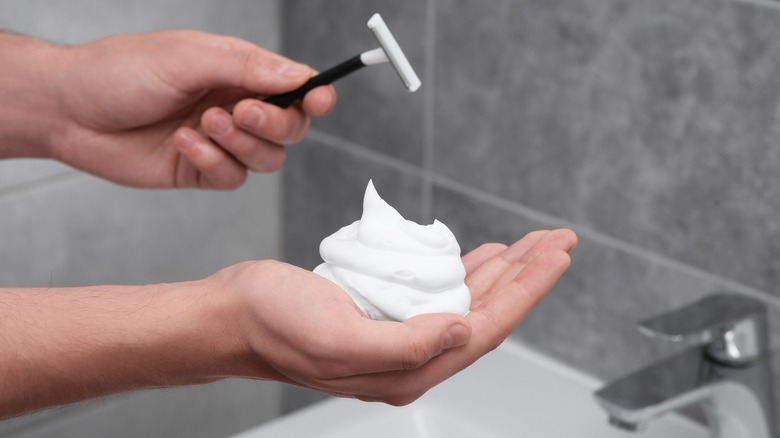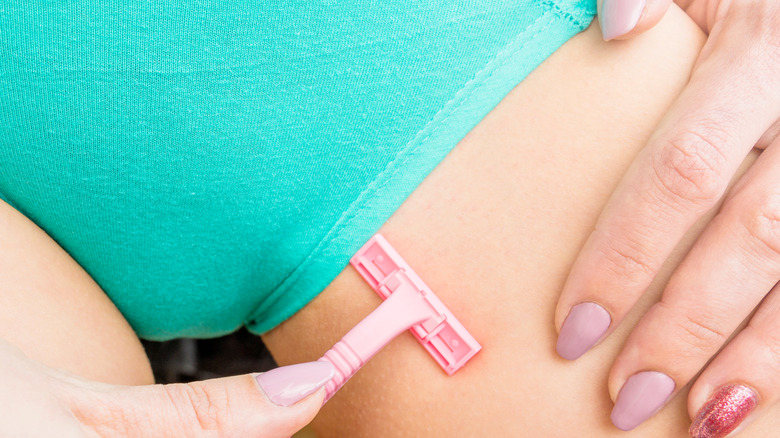Doing This Before Having Sex Is More Dangerous Than You Think
Before doing the deed, some of us enjoy a pre-sex routine. Maybe this includes lighting candles, a little foreplay with your partner, cueing up some music, or a spray of your favorite fragrance to help get your mind off the hustle and bustle of the day and ground yourself back into your body. If a little grooming before sexual activity helps you feel your best, you might also choose to lather on some lotion, jump in the shower, or give your nether regions a quick shave. Whether you prefer waxing, shaving, or letting your body hair grow as it pleases, hair removal is a personal choice. For those who prefer a little pubic hair maintenance, however, you may want to hold off on shaving immediately before sex.
Pubic hair serves an important purpose, particularly for people with vaginas. It keeps the area moist and free of contaminants, as well as warm and toasty. The American College of Obstetricians and Gynecologists further notes that pubic hair may even factor into sexual attraction and physical pleasure. However, doing away with our "down-there" hair prior to getting hot and heavy can increase the risk of skin irritation, itching, rashes, and sexually transmitted infections (STIs), according to the Kinsey Institute.
Shaving may lead to genital itching or UTIs
In a 2014 study published in The Journal of Sexual Medicine, researchers compiled data regarding the pubic hair grooming practices of over 1,100 male and female university students. They took note of why participants chose to engage in these practices, their preferred pubic hairstyles in sexual partners, and any symptoms experienced related to pubic hair maintenance. The majority of students reported shaving as their chosen method of hair removal, with genital itching found to be the most common symptom experienced. Sex may very well exacerbate these symptoms when there's no pubic hair to ease the friction experienced during intercourse.
Pubic hair grooming may also pave the way for unwanted urinary tract infections (UTIs). According to the findings of a 2023 study published in Scientific Reports, women who engaged in complete and total pubic hair removal two times a week or more within the last year had triple the risk of getting recurrent UTIs. But UTIs aren't the only types of infections we may be making ourselves susceptible to when shaving before sex.
Pubic shaving may increase the risk of STIs
No matter what body part we're shaving, razors create small nicks on the surface of our skin. "We know that shaving creates microtears and cuts," OB-GYN at Kaiser Permanente Northern California Jennifer Gunter told NPR. A quick shave before sexual intercourse means these wounds are still fresh, creating an opening for germs to weasel their way into the body. This includes STIs, which have one distinct difference from sexually transmitted diseases (STDs).
In a 2017 study published in the British Medical Journal, survey data regarding the pubic hair grooming and removal habits of men and women between the ages of 18 and 65 revealed a link between pubic grooming — even just once — and a history of STIs. This included cutaneous STIs like herpes and syphilis as well as secretory STIs like gonorrhoea, chlamydia, and HIV.
Although there are other hair removal options beyond shaving, such as waxing, sugaring, creams, or laser removal, they can come with their own risks. When deciding what's right for you, having all the information can be helpful, including being aware of the potential health risks of pubic hair removal.



